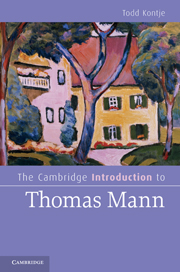Book contents
- Frontmatter
- Contents
- Chronology
- 1 Introduction
- 2 Origins, influences, and early mastery
- 3 Artists and outcasts in Mann’s early fiction
- 4 From world war to the Weimar Republic
- 5 The struggle against National Socialism
- 6 A pact with the devil: Doctor Faustus
- 7 Tribulations and final triumphs
- Notes
- Suggested further reading
- Index
1 - Introduction
Published online by Cambridge University Press: 05 September 2012
- Frontmatter
- Contents
- Chronology
- 1 Introduction
- 2 Origins, influences, and early mastery
- 3 Artists and outcasts in Mann’s early fiction
- 4 From world war to the Weimar Republic
- 5 The struggle against National Socialism
- 6 A pact with the devil: Doctor Faustus
- 7 Tribulations and final triumphs
- Notes
- Suggested further reading
- Index
Summary
With the possible exception of Franz Kafka, Thomas Mann (1875–1955) is the best-known German writer of the early twentieth century. Unlike Kafka, however, who was known only to a small circle of admirers until more than a generation after his death, Thomas Mann was famous from the time that he published his first novel in 1901. Mann’s cultivated manners and elegant clothing betrayed his patrician origins, and he wrote with the stylistic virtuosity of a nineteenth-century realist, but his works captured the anxious spirit of modern times, full as they were of gender confusion, artistic crisis, physical decline, and moral decay. Had Mann died in 1913, he might have been remembered as a significant writer with a limited range, the author of undisputed masterpieces in Buddenbrooks and Death in Venice (Der Tod in Venedig, 1912), but also of a disappointing second novel, a failed drama, and several half-finished projects. He was well-known in literary circles and popular among general readers, but he was not yet the iconic figure who became known as the living embodiment of German national culture.
History changed all that. When war broke out in August 1914, Thomas Mann – who had never taken much interest in politics – found himself writing patriotic essays. As the war dragged on, Mann wrote page after page of his Reflections of a Nonpolitical Man, a work that established his credentials as a leading right-wing intellectual. To everyone’s surprise and to the great disappointment of his fellow conservatives, Mann reversed course just four years later to voice his public support for the fledgling democracy of the Weimar Republic. To his own surprise, Mann found himself in exile little more than a decade later, stating sadly in his public break with the Nazi government that he was better suited to be a representative than a martyr. Within a few years, the quintessential German found himself living in California as an American citizen; the “nonpolitical man” was delivering political speeches on a regular basis. Meanwhile, the writing continued and the accolades rained down: novel followed novel, from The Magic Mountain through Joseph and his Brothers to Doctor Faustus; the honorary degree that had been revoked by the University of Bonn in 1936 was soon replaced by others from Berkeley, Harvard, Oxford, and Cambridge.
- Type
- Chapter
- Information
- The Cambridge Introduction to Thomas Mann , pp. 1 - 12Publisher: Cambridge University PressPrint publication year: 2010



